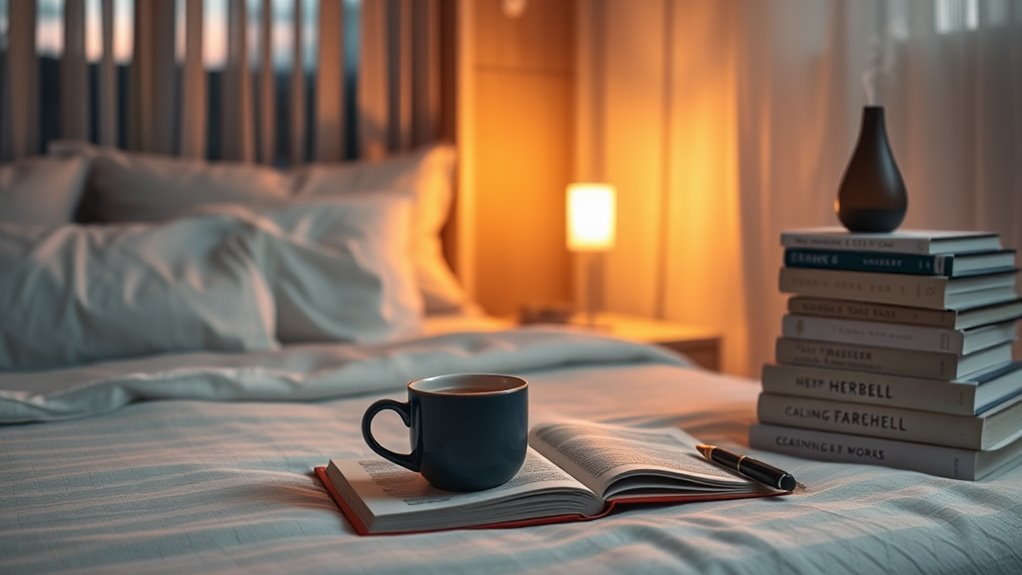How to Create the Perfect Evening Routine for Better Sleep
To create the perfect evening routine for better sleep, start by setting a consistent bedtime and wake-up time. Turn off electronics by 9 PM to reduce blue light exposure. Incorporate relaxation techniques, like deep breathing or gentle stretching, to signal your body it’s time to unwind. Make your bedroom sleep-friendly by keeping it cool and dark, and consider calming scents like lavender. Limit caffeine and exercise in the evening, and maintain a sleep journal to track what works for you. Follow these steps, and you’ll be on your way to optimizing your nightly rest. There’s much more to explore on enhancing your sleep habits!
Key Takeaways
- Establish a consistent bedtime and wake-up time to regulate your internal clock and enhance sleep quality.
- Limit screen time and turn off electronics by 9:00 PM to reduce blue light exposure before sleep.
- Incorporate relaxation techniques, such as deep breathing or gentle stretching, to calm your mind and body.
- Create a sleep-friendly environment by maintaining a cool room temperature and using blackout curtains to block light.
- Keep a sleep journal to track patterns and adapt your routine based on factors influencing your sleep quality.
Importance of an Evening Routine
As you wind down your day, establishing an evening routine can greatly enhance your sleep quality. A consistent routine signals to your body that it’s time to relax, making it easier to shift into sleep.
When you follow specific activities each night, you create a sense of predictability, reducing stress and anxiety. This predictability helps your mind and body know when to unwind, promoting better overall rest.
Additionally, a well-structured evening routine can help you prioritize sleep, allowing you to set aside distractions like screens or work. By committing to this routine, you’re investing in your health and well-being, leading to improved mood, focus, and productivity the next day.
Key Relaxation Techniques
Incorporating a few key relaxation techniques into your evening routine can greatly improve your ability to fall asleep.
Start by practicing deep breathing exercises; inhale slowly through your nose, hold for a moment, then exhale gently through your mouth. This calms your mind and body.
Next, consider gentle stretching or yoga to release muscle tension. You might also try progressive muscle relaxation, where you tense and then relax each muscle group, promoting overall relaxation.
Listening to soothing music or nature sounds can create a peaceful atmosphere.
Finally, set aside time for journaling to clear your mind of lingering thoughts.
These techniques not only ease your shift to sleep but also enhance your nighttime serenity, helping you wake refreshed.
Optimal Timing for Sleep
Establishing a consistent evening routine that includes relaxation techniques sets the stage for better sleep, but timing your sleep is equally important. Aim to go to bed and wake up at the same time every day to regulate your body’s internal clock. This consistency helps improve the quality of your sleep.
| Time | Activity | Purpose |
|---|---|---|
| 9:00 PM | Turn off electronics | Reduce blue light exposure |
| 9:30 PM | Wind down with a book | Promote relaxation |
| 10:00 PM | Practice deep breathing | Calm your mind |
| 10:30 PM | Sleep | Optimize restorative sleep |
Lifestyle Adjustments for Rest
Making simple lifestyle adjustments can greatly enhance your ability to rest and rejuvenate.
Start by evaluating your daily habits. Limit caffeine intake, especially in the afternoon, as it can interfere with your ability to wind down. Incorporate regular physical activity into your routine, but try to avoid intense workouts close to bedtime. Instead, consider gentle exercises like yoga or stretching.
Establish a consistent bedtime and wake-up time to regulate your body’s internal clock. Also, be mindful of your screen time; reduce exposure to blue light in the evening, which can disrupt melatonin production.
Finally, practice relaxation techniques, such as deep breathing or meditation, to help calm your mind and prepare for a peaceful night’s sleep.
Creating a Sleep-Friendly Environment
Creating a sleep-friendly environment is essential for a good night’s rest. Start by keeping your bedroom cool, ideally between 60 and 67 degrees Fahrenheit.
Use blackout curtains to block out any intrusive light, and consider a white noise machine or fan to drown out distracting sounds. Invest in a comfortable mattress and pillows that support your preferred sleeping position.
Declutter your space to promote relaxation, and reserve your bed for sleep and intimacy only. Limit screen time before bed; the blue light from devices can interfere with melatonin production.
Finally, incorporate calming scents like lavender with essential oils or candles. By making these adjustments, you’ll create a sanctuary that encourages restful sleep and relaxation.
Tracking Your Progress and Adaptations
Tracking your progress is essential for refining your evening routine and ensuring it promotes better sleep.
Start by keeping a sleep journal where you note your bedtime, wake-up time, and any factors that influenced your sleep quality, like stress or screen time. Over a few weeks, look for patterns—what works and what doesn’t.
If you notice certain activities help you wind down, incorporate them more consistently. Conversely, if something disrupts your sleep, consider adjusting or eliminating it.
Additionally, use sleep-tracking apps or devices to gather data on your sleep patterns. Regularly review this information to adapt your routine as needed.
Small tweaks can make a big difference, so stay flexible and attentive to your body’s signals.
Frequently Asked Questions
What Foods Should I Avoid Before Bedtime?
You should avoid heavy meals, caffeine, and sugary snacks before bedtime. Foods like chocolate, spicy dishes, and alcohol can disrupt your sleep. Instead, opt for light snacks if you need something before sleeping.
Can Technology Affect My Evening Routine?
Absolutely, technology can disrupt your evening routine. Screen time before bed often affects your sleep quality, as blue light interferes with melatonin production. Consider limiting device usage to create a more calming atmosphere for winding down.
How Long Should My Evening Routine Last?
Your evening routine should ideally last between 30 to 60 minutes. This timeframe allows you to unwind, disconnect from screens, and prepare your mind and body for sleep without feeling rushed or overwhelmed.
Is Napping During the Day Advisable?
Napping during the day can be beneficial, but it depends on your individual needs. If you keep it short—around 20-30 minutes—you’ll boost your energy without interfering with your nighttime sleep. Just listen to your body.
Can Stress During the Day Impact My Sleep?
Yes, stress during the day can greatly impact your sleep. When you’re stressed, your mind races and your body stays alert, making it harder to relax at night and get the restful sleep you need.



